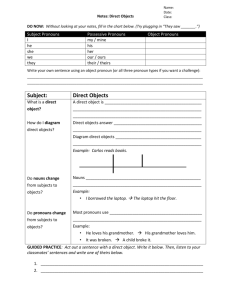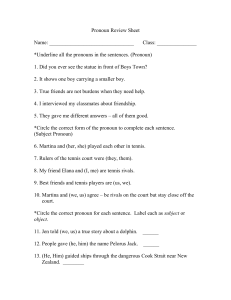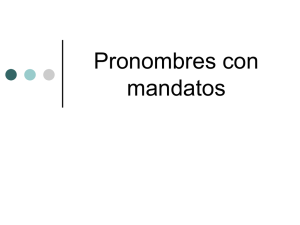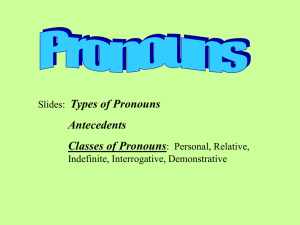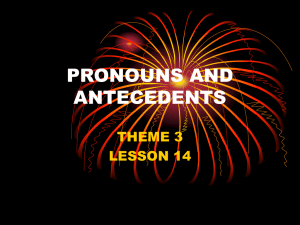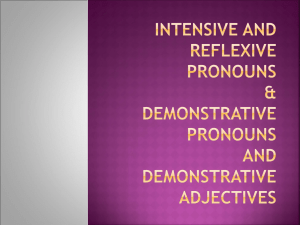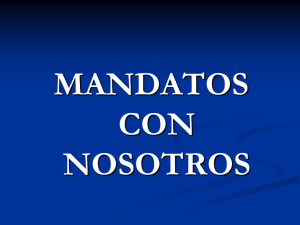Unit 4- Pronouns
advertisement
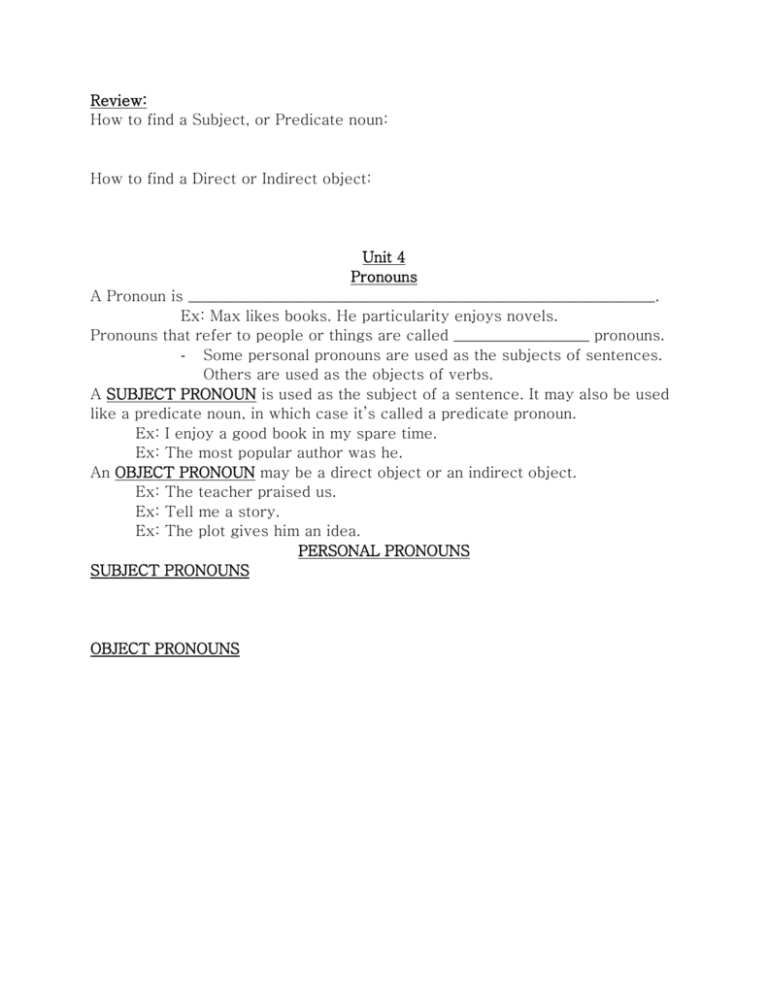
Review: How to find a Subject, or Predicate noun: How to find a Direct or Indirect object: Unit 4 Pronouns A Pronoun is ______________________________________________________________. Ex: Max likes books. He particularity enjoys novels. Pronouns that refer to people or things are called __________________ pronouns. - Some personal pronouns are used as the subjects of sentences. Others are used as the objects of verbs. A SUBJECT PRONOUN is used as the subject of a sentence. It may also be used like a predicate noun, in which case it’s called a predicate pronoun. Ex: I enjoy a good book in my spare time. Ex: The most popular author was he. An OBJECT PRONOUN may be a direct object or an indirect object. Ex: The teacher praised us. Ex: Tell me a story. Ex: The plot gives him an idea. PERSONAL PRONOUNS SUBJECT PRONOUNS OBJECT PRONOUNS Identifying Personal Pronouns Directions- Place a box around the SUBJECT PRONOUNS and a circle around the OBJECT PRONOUNS. **HELP YOURSELF. WRITE THE SUBJECT AND OBJECT PRONOUN CHART HERE** SUBJECT PRONOUNS OBJECT PRONOUNS 1. They awarded her the prize. 2. We drove them to the airport. 3. I fixed him a tuna sandwich. 4. The person saw you and him at the mall. 5. They saw you and him at the mall. 6. He and she found it on the beach. 7. The winner of the essay contest was I. 8. It showed us the location of the treasure. 9. She helped you with the dishes. 10.You are giving me a headache. 4.2 Using Pronouns SUBJECT PRONOUNS PRONOUNS ____ was missing. S P st 1 POV 1st POV 2nd POV 2nd POV 3rd POV 3rd POV OBJECT Mary faced____ . S P - Use subject pronouns in compound subjects. Use object pronouns in compound objects. Ex: He and Carmen wrote the report. Ex: Tell John and me about the report. - If you’re not sure which form of the pronoun to use, read the sentence with only the pronoun as the subject or the object. - When I, we, me, or us is part of a compound subject or object, I, we, me, or, us should come last. (It is simply courteous to name yourself or the group of which you are a part last.) Ex: Lee and I played some new tunes. Ex: Country music interests Lee and me. - In formal writing and speech, use a subject pronoun after a linking verb. Ex: The writer of this report was she. Ex: It is I. Directions: Circle the correct word or phrase from the choices in parentheses. 1. Kareen will save Mr. Jerome and (we, us) seats in the bleachers. 2. (Jed and I, I and Jed, Me and Jed, Jed and me) fixed the bicycle ourselves. 3. The drama director assigned (we, us) volunteers jobs as ushers. 4. The coach told (Sally and I, I and Sally, me and Sally, Sally and me) the results of the tryouts for the volleyball team. 5. Ziggy and (we, us) took the subway to the zoo. Name: __________________________________________ Directions: Identify each personal pronoun. Label it as a SP (subject pronoun) or OP (object pronoun) 1. The girl in the picture is I. 2. We saw her at the mall. 3. She handed me the notes from yesterday’s science class. 4. You gave them a chance, but they wasted it. 5. The mysterious stranger was he, and I thanks him for the help. Directions: Circle the correct word or phrase from the choices in parentheses. 1. (You and I, You and me, I and you, Me and you) make a good team. 2. Su and (he, him) explored the cave together. 3. The store owner gave (he and I, I and he, him and me, me and him) parttime jobs. 4. (She, Her) and Mrs. Cranston share the garden chores and the vegetables. 5. Mr. Lusalah gave (he and she, him and her, her and her, him and she) several old comic books. 6. (We, Us) newspaper carries struggle with the heavy Sunday edition. 7. (Clare and I, Clare and me, I and Clare, Me and Clare) took photographs of the race, and (Samantha and they, Samantha and them) developed the pictures in a tiny darkroom. 8. Mom tested Charlie and (she, her) on their spelling words. 9. The most exciting actor was (he, him). 10.The scientist showed Zainab and (they, them) the fossil of a trilobite. 4.3 Pronoun and Antecedents -Read the following sentence. Who is the she referring to? ___________________________ Ex: Louisa May Alcott wrote a novel about a young woman. She had three sisters. -The sentence is not clear because the word she could refer to either Louise May Alcott or a young woman. Sometimes you must repeat a noun or rewrite a sentence to avoid confusion. Ex: Louisa May Alcott wrote a novel about a young woman. She had three sisters. The young woman had three sisters. -The word a pronoun refers to is called the ANTECEDENT. The word antecedent means “going before”. -When you use a pronoun, be sure it refers to its antecedent clearly. Be especially careful when you use the pronoun they. Ex: They have five books by Alcott at the school library. The meaning of they is unclear. The sentence can be improved by rewriting it in the following way. Ex: The school library has five books by Alcott. - When you use pronouns, be sure they agree with their antecedents in number (singular or plural) and gender. The gender of a noun may be masculine, feminine, or neuter. Ex: The Marches must face death in the family. They face it with courage. Practice: Write each personal pronoun and its antecedent. If a pronoun doesn’t have a clear antecedent, rewrite the numbered item to make the meaning clear. 1. Mr. Cannon talked to Marc about journalism. He lies to write humaninterest stories. 2. Marc did a report about Katherine Graham. For many years, she headed the Washington Post Company. 3. In 1939, Katherine joined the staff of the Washington Post. It was a wellknown newspaper owned by Katherine’s father. 4. In 1940, Katherine married Philip Graham. He became publisher of the Post in 1948; he died in 1963. 5. Then Katherine became publisher. She wanted to make the Post an important newspaper. 4.4 Possessive Pronouns - You often use personal pronouns to replace nouns that are subjects or objects in sentences. You can use pronouns in place of possessive nouns, too. A possessive pronoun is a pronoun that shows ____________________________________________________________________________. Ex: Lisa’s class put on a play. Her class put on a play. Ex: The idea was Lisa’s. The idea was hers. POSSESSIVE PRONOUNS Used before nouns: ______ shoe is here. Used Alone: That shoe is _____. S P S P My our mine ours Your your yours yours Her, his, its their hers, his, its theirs - Possessive pronouns are not written with apostrophes. Don’t confuse the possessive pronoun its with the word it’s. It’s is a contraction of it is or it has. Practice: Circle the possessive pronouns 1. Which equipment is yours, and which equipment is hers? 2. These are out costumes for the class play. 3. Jackson asked for her email address. 4. The ficus tree has lost its leaves. 5. Some of the school supplies are ours. 6. His backpack is lighter than yours. 7. My sister is staying overnight at their house. 8. Is the camera hers or mine? 9. Is your brother coming to our concert? 10.It’s easy to follow their directions. Name:____________________________________________________ Directions: Circle each personal pronoun. Above it label it as a SPS (subject pronoun as subject), SPP (subject pronoun as predicate), OPDO (object pronoun as DO), OPIO (object pronoun as IO). 1. She was teaching the course. 2. We offered him the job. 3. The only boy on the team is I. 4. The teacher gave her the results of the test, and he congratulated her. 5. You gave her the newsmagazine yesterday, but she has not read it yet. Directions: Circle the correct word or phrase from the choices in parenthesis. 1. Dad asked Harry and (she, her) about the article in the school newspaper. 2. The announcer for tonight’s big basketball game is (he, him). 3. (We, Us) cousins go to the same day camp every summer. 4. Nathan and (he, him) are getting summer jobs with the city’s park district. 5. (Kristen and I, I and Kristen, Kristen and me, Me and Kristen) are switching lockers. 6. The first presenter in the eighth-grade speech contest was (she, her). 7. The coach gave (they, them) this month’s practice schedule. 8. (I and you, You and I, Me and you, You and me) can ride to practice together. 9. The teacher gave (she and I, she and me, her and I, her and me) a copy of the report. 10.Mom and (she, her) are opening a savings account at the new bank in town. Name: _____________________________________ REVIEW Subject Pronouns Object Pronouns 1. I asked her the question. 2. Alicia bought me a beautiful gift from Mexico. 3. The player in the uniform was you! 4. I saw you and her in the parade. 5. Max saw you at the museum. 6. Jude asked me the question. 7. The best athlete on the team was she. 8. He gave me the discount coupon. 9. You are coming to usher at 7:00pm. 10.She and he put it into the suitcase. Name:_________________________________________________ Ms. McHugh Unit 4- Pronoun Quiz- REVIEW Directions: Fill in the chart. Subject Pronouns 3/18/15 ELA Object Pronouns Directions: Circle the personal pronouns. Label above each circle as SP or OP. 1. The boy in the painting is I. 2. We saw him at the mall. 3. She handed me the document. 4. He gave them a chance, but they wasted it. 5. The mysterious man was he, and I thanked him for the gift. Directions: Circle the correct phrase or word from the choice in parentheses. 1. Mrs. Syd and (we,us) watched the free performance at the park. 2. (You and I, I and you, You and me, Me and you) tasted peaches in Georgia and ate crab in Maryland. 3. The astronomer told (she and he, she and him, her and he, her and him) about the meteor shower. 4. At the construction site, the supervisor gave Greg and (they, them) hammers, saws, and nails. 5. Hariza and (she, her) left the house early in the morning. Directions: Circle each personal pronoun. Above it label it as a SPS (subject pronoun as subject), SPP (subject pronoun as predicate), OPDO (object pronoun as DO), OPIO (object pronoun as IO). 1. 2. 3. 4. 5. 6. 7. 8. You and I make a good team. Brooke and he explored the school together. The bookstore owner gave you and me part time jobs. She and Mrs. Dietz share the classroom. Mr. Tobin gave him and her several volleyballs. We are buying it tomorrow. The most exciting actor was you. Mia and I took photographs of the flower, and Nina and they developed the pictures. 9. The people in the photographs were they. 10.She and I are auditioning for it. CHANCE FOR A 5/E Directions: Underline the possessive pronouns in each sentence. 1. Which equipment is yours, and which equipment is hers? 2. Is the camera hers or mine? 3. Is your brother coming to out concert? 4. It’s easy to follow their directions. 5. Some of the school supplies are ours. Name: ____________________________________ Review of 4.3 and 4.4 Directions: Circle the personal pronoun, and then draw a line to the antecedent. If it doesn’t have a clear antecedent, rewrite the pronoun to make sense. 1. Ms. Johnson spoke to Mary about the science fair. She was enthuastic. 2. Jody’s grandparents are experts in motorcycle repair. They often talk to Jody about it. 3. They have no books about women in chemistry at the library. 4. Malcolm went to the mall with Jaleel. He needed some new shoes. 5. Myrna collects books about baseball history. She keeps them in a special bookcase. 6. They charge too much for the latest albums at Music Madness. 7. The Lloyds have adopted a boy and a girl. They love him and her equally. 8. In the geography book, they don’t have up-to-date maps of Africa. 9. Todd has an expensive new bike. He takes good care of it. 10.The students filled the vases with flowers for the sick. Mrs. Shelby sent them to a nursing home. Directions: Underline the possessive nouns. 1. These are their tickets. Where are ours? 2. This is his equipment. Theirs is in the lab. 3. Did you prefer her performance or his? 4. It’s been a pleasure to meet your parents. 5. Is this jacket yours, or is it hers? 6. Will your mother or your dad pick us up after our game? 7. My best friends is staying at our house. 8. The dishwasher has finished its cycle. 9. Where are your coats? Here is mine. 10.Their new house will be smaller than yours. 4.7 Interrogative and Demonstrative Pronouns (there is no 4.5 and 4.6) An interrogative pronoun is a pronoun used to ____________________ ______________________________________________________. The interrogative pronoun who and whom refer to people. Who is used when the interrogative pronoun is the subject of the sentence. Whom is used when the interrogative pronoun is an object. Ex: Who borrowed the book? Ex: Whom did the librarian call? Which and what refer to things and ideas. Ex: Which is it? Ex: What interests you? Whose shows possession. Don’t confuse whose with who’s. Who’s is a contraction of who is or who has. Ex: I found a copy of the play. Whose is it? A demonstrative pronoun is a pronoun that ________________________________________ ______________________________________________________________________________ ____. The demonstrative pronouns are this, that, these, and those. This (singular) and these (plural) refer to things nearby. That (singular) and those (plural) refer to things at a distance. Ex: This is an interesting book. Ex: These are interesting books. Ex: That was a good movie. Ex: Those were good movies. Name: __________________________________________ Practice: Circle the correct word from the choices in parentheses. 1. (Who, Whom) left these muddy shoes in the living room? 2. (Who, whom) did you meet at the mall this afternoon? 3. (Whose, Who’s) that bald man with the yellow umbrella? 4. (Who’s, whose) arranging the trip? 5. (That, those) is not the picture I took. 6. (This, these) are the museum’s floor plans. 7. (What, which) of the two science fiction movies did you like best? 8. (Those, These) over there are for the students. 9. Several backpacks were left in the bus. (Who’s, whose) are they? 10.She is not the woman (who, whom) we saw leaving the theater. Review for TEST 4.1-4.4 Directions: Circle each personal pronoun. Above it label it as a SPS (subject pronoun as subject), SPP (subject pronoun as predicate), OPDO (object pronoun as DO), OPIO (object pronoun as IO). 1. She was teaching the course. 2. We offered him the job. 3. The only boy on the team is I. 4. The teacher gave her the results of the test, and he congratulated her. 5. You gave her the newsmagazine yesterday, but she has not read it yet. 6. Dad asked Harry and (she,her) about the article in the school newspaper. 7. The announcer for tonight’s big game is (he, him) 8. (We, Us) cousins go to the same day school every year. 9. Nathan and (he, him) are getting summer jobs with the city’s park district. 10.(Nick and I, I and Nick, Nick and me, Me and Nick) are switching lockers. 11.The first presenter in the eighth grade speech contest was (she, her) 12.The coach gave (they, them) this month’s practice schedule. 13.(I and you, You and I, Me and you, You and me) can ride together to practice. 14.The teacher gave (she and I, she and me, her and I, her and me) a copy of the test. 15.Mom and (she, her) are opening a savings account at the new bank in town, Directions: Circle the personal pronoun. Draw an arrow to the antecedent. If the pronoun does not have a clear antecedent, replace it. 1. Europe has been home to many explorers, It has also been home to many scientists. 2. Alexander Von Humbolt and Aime Bonland sailed to South America. They explored the Orinoco River. 3. The explorers crossed dry, dusty plains. They stretched to the south. 4. Later Humboldt studied the cold current off the South American coast. It was later named the Humboldt Current. 5. Humboldt returned to Germany. He then wrote books. 6. Katherine worked hard. She increased the paper’s budget. 7. In the 1970s, the post published a series of stories about Watergate. It won the Pulitzer Prize in journalism. 8. The Post got information about the Watergate scandal from an anonymous source. They wrote about it without identifying the source. 9. The report said the president and his aides were involved in the scandal. They denied being involved. 10.Katherine’s son replaced her as publisher in 1978. Directions: Create 10 sentences using personal pronouns correctly. Make sure to then label the pronouns. 1. 2. 3. 4. 5. 6. 7. 8. 9. 10. Directions: Create 10 sentences using possessive pronouns. Underline the possessive pronouns. 1. 2. 3. 4. 5. 6. 7. 8. 9. 10. Name: _____________________________________________ 3/24/15 Ms. McHugh ELA Grade 7 Test Prep Directions: Fill out the following charts. SUBJECT PRONOUNS OBJECT PRONOUNS Directions: Circle all the personal pronouns. Above each pronoun, label it as SP (subject pronoun) or OP (object pronoun) 1. They awarded her the prize. 2. We drove them to the airport. 3. I fixed him a tuna sandwich. 4. The person saw you and him at the mall. 5. They saw you and him at the mall. 6. He and she found it on the beach. 7. The winner of the essay contest was I. 8. It showed us the location of the treasure. 9. She helped you with the dishes. 10.You are giving me a headache. 11.Kareen will save Mr. Jerome and (we, us) seats in the bleachers. 12.(Jed and I, I and Jed, Me and Jed, Jed and me) fixed the bicycle ourselves. 13.The drama director assigned (we, us) volunteers jobs as ushers. 14.The coach told (Sally and I, I and Sally, me and Sally, Sally and me) the results of the tryouts for the volleyball team. 15.Ziggy and (we, us) took the subway to the zoo. Directions: Circle all the personal pronouns. Label the pronoun as SPS (subject pronoun as subject), SPP (subject pronoun as predicate pronoun), OPDO (object pronoun as direct object), OPIO (object pronoun as indirect object). 6. The girl in the picture is I. 7. We saw her at the mall. 8. She handed me the notes from yesterday’s science class. 9. You gave them a chance, but they wasted it. 10.The mysterious stranger was he, and I thanks him for the help. 11. (You and I, You and me, I and you, Me and you) make a good team. 12.Su and (he, him) explored the cave together. 13.The store owner gave (he and I, I and he, him and me, me and him) parttime jobs. 14.(She, Her) and Mrs. Cranston share the garden chores and the vegetables. 15.Mr. Lusalah gave (he and she, him and her, her and her, him and she) several old comic books. 16.(We, Us) newspaper carries struggle with the heavy Sunday edition. 17.(Clare and I, Clare and me, I and Clare, Me and Clare) took photographs of the race, and (Samantha and they, Samantha and them) developed the pictures in a tiny darkroom. 18.Mom tested Charlie and (she, her) on their spelling words. 19.The most exciting actor was (he, him). 20.The scientist showed Zainab and (they, them) the fossil of a trilobite. Directions: Circle the personal pronoun and draw and arrow to the antecedent. If there is not a clear antecedent, cross out the pronoun and re-write the noun. 1. Mr. Carlin talked to Terence about journalism. He likes to play guitar. 2. Thomas did a report about Katie Perry. For many years, she struggled to become famous. 3. Cheryl and Jan went to the mall. She liked to go to it on Wednesdays. 4. Grace and Bobby play volleyball. They have practice today. 5. He went to the store. It was crowded. Directions: Place a box around the possessive pronouns 11.Which book is yours, and which book is hers? 12.These are our robes for stations. 13.Jackson asked for her phone number. 14.The berry tree has lost its leaves. 15.Some of the computers are ours. 16.His lunch box is lighter than yours. 17.My sister is staying at their house. 18.Is the hand sanitizer hers or mine? 19.Is your cousin coming to our play? 20.It’s easy to follow their directions. Directions: Circle the Interrogative and Demonstrative pronouns. Place an I over the interrogative pronouns and a D over the demonstrative pronouns. 1. Whom is that boy sitting next to Dallas? 2. That was a horrible experience. 3. These are our children. 4. Which is the road that leads to the train station? 5. Who is the person in the costume? 6. (Who, Whom) left these muddy shoes in the living room? 7. (Who, whom) did you meet at the mall this afternoon? 8. (Whose, Who’s) that bald man with the yellow umbrella? 9. (Who’s, whose) arranging the trip? 10.(That, those) is not the picture I took. 11.(This, these) are the museum’s floor plans. 12.(What, which) of the two science fiction movies did you like best? 13.(Those, These) over there are for the students. 14.Several backpacks were left in the bus. (Who’s, whose) are they? 15.She is not the woman (who, whom) we saw leaving the theater.


